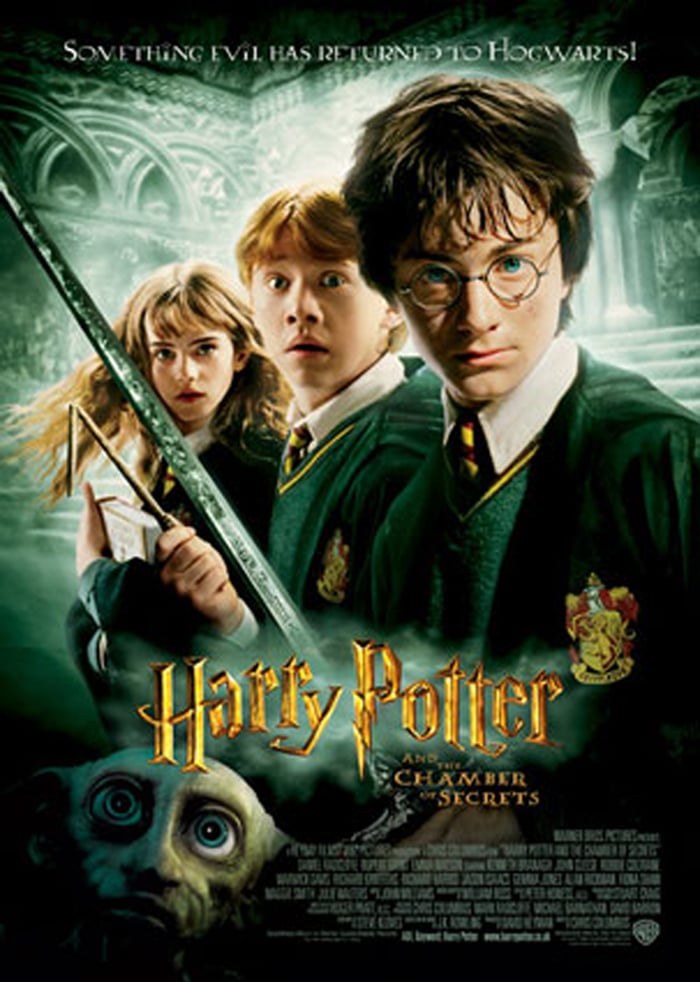
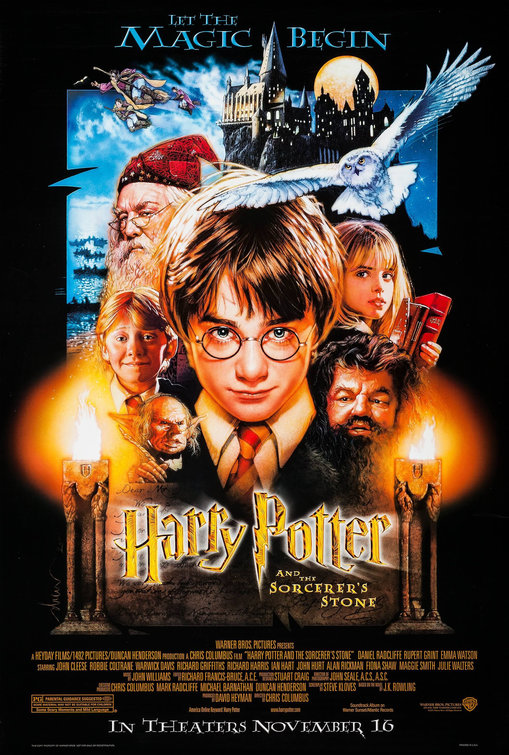
A recent trip to the truly excellent Harry Potter Studios in London has inspired a re-watch of the film series. The tour of the relics left behind from the filming of the series stirred up nostalgic memories of growing up with both the films and the books for me. For twenty-something year olds literally grew up with the characters both on page and on screen. In fact, outside of
Star Wars,
Indiana Jones and
The Lord of the Rings, I've probably watched this series of films more than any other franchise. To re-count the influence this series has had on millions on children, teenagers and adults is almost counter-productive. You only need to look at the rise of young-adult fiction and a move to Hollywood concentrating on adapting geek franchises to see how far Potter's influence has reached. In fact, I would argue that without the success of
Harry Potter (and
The Lord of the Rings) that the 'shared universe' phenomena of Marvel would not have a platform to build on.
So with billions of dollars in box-office gross, millions of copies of the books sold and upcoming spin-off franchises, what is there really left to discuss with
Harry Potter as a film franchise? Well, I think I can shed an alternative perspective on the films and that is how successful the series actually operates as, well, a series. Most people know the merits of the individual films but how well do they hold together as part of one epic story?
The Lord of the Rings was planned as essentially one 9 hour film, divided into three parts. Marvel plans its films in minute detail, with the upcoming roster going well into the 2020s. The
Harry Potter films were produced while the books were still being written, amidst various changes in directors. This meant the filmmakers had to take a lot on faith and had to adapt their approach as more of J.K. Rowling's master plan for the series leaked out. Does this make for a tonally inconsistent series overall or do the decisions made actively help the series along as it became increasingly darker in tone? I actually think it's prudent to discuss the films in pairs, which will become clear with each article. In, Part One, I will discuss the early years,
Philosopher's Stone and
Chamber of Secrets, in what I call
The Spielberg Years. Part Two will tackle the best film in the franchise,
Prisoner of Azkaban, and how the producers followed this up,
Goblet of Fire, in
Something Wicked This Way Comes. Part Three will compare one of the best and one of the worst in the series,
Order of the Phoenix and
Half-Blood Prince respectively, as part of a wider discussion on
The Art of the Adaptation. And finally Part Four,
The End of all Things, will unpack how successfully the film franchise ends with
The Deathly Hallows.
So it's the late 90s. Tony Blair has ushered in a new era of a Labour-led British government. Bill Clinton faces impeachment proceedings. Paranoia is growing about the so-called Millennium Bug. Furbies are everywhere. And
Harry Potter has become a quiet cultural phenomenon amongst book-lovers. J.K. Rowling's 'rags-to-riches' real life story has captivated the world and the mature, well-written novels captured the imaginations of millions of children and adults. Warner Bros. snatched up the rights to adapt the current, and future, novels into a film franchise. With the potential for seven films, this is something of a risk for the studio.
Harry Potter had not quite broken into the mainstream, along with a contract clause stating that the cast must be all British/Irish (at the request of Rowling) and, of course, the potential disaster of child leads. A mis-casting here could spell doom not just for this first film but potentially all the future films. Time and care needed to be taken to please fans and to entice an audience who might not be necessarily be familiar with the books. Thus, the first two films take on a workman-like approach to adapting the material. No risks were taken. Pretty much every chapter is translated on screen with little done to actually
adapt the material. How does this affect them as films? Let's discuss...
 |
| J.K. Rowling, a hero to millions around the world, at the Goblet of Fire book launch, a year before the first film was released |
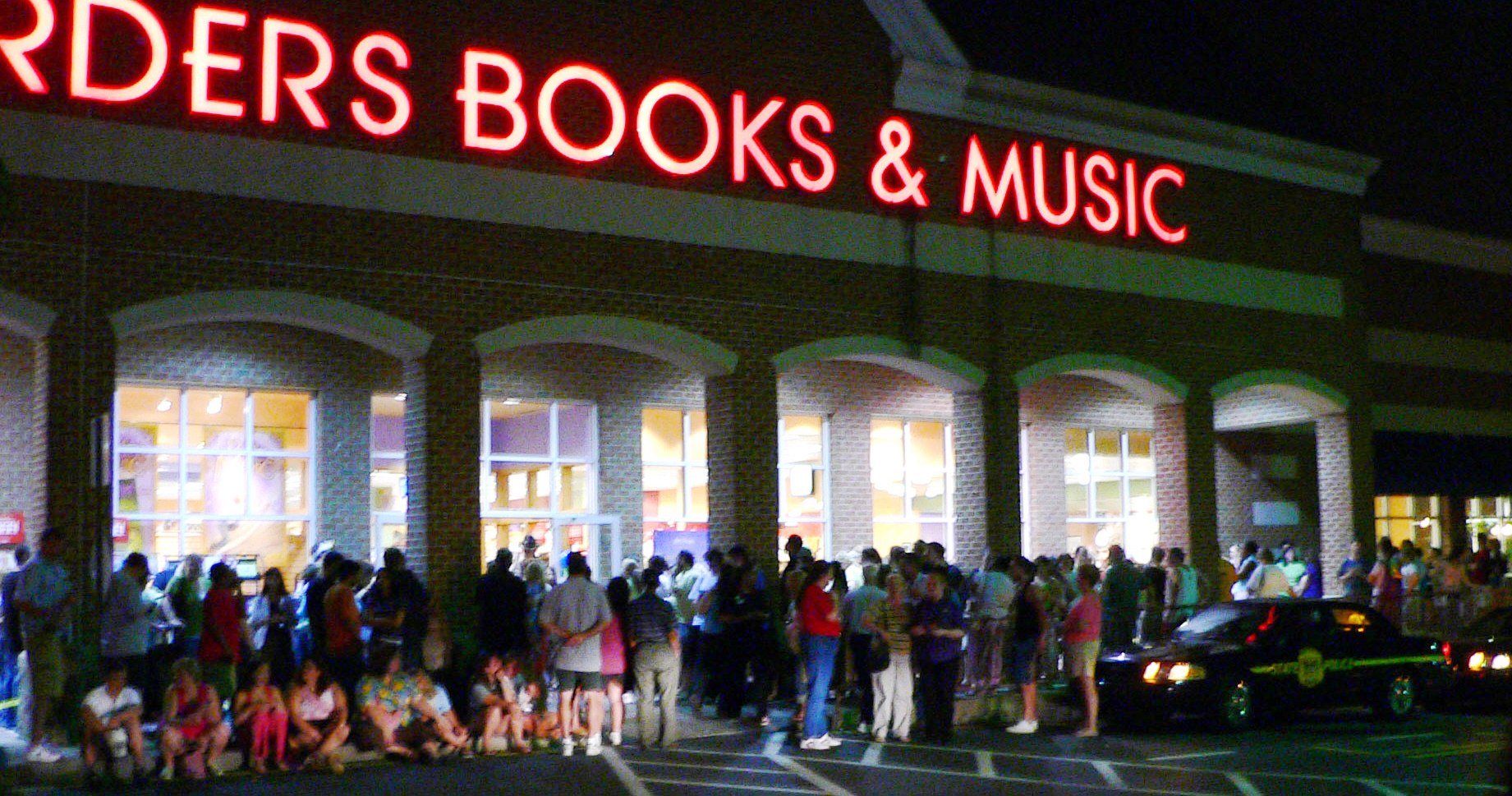 |
| The magical days of queuing for the new Harry Potter book |
So why do I call this set of films The Spielberg Years? Well, for one thing, Spielberg was in the running for director, along with maverick Terry Gilliam, so who knows what the eyes of these masters could have brought to the films. Then, just look at that Drew Struzan poster for
Philosopher's Stone and tell me you are not reminded of
Indiana Jones or
Star Wars (obviously not directed by Spielberg but closely linked). Warner Bros. clearly wanted to evoke classic film franchises to bring a feeling of warm nostalgia to the marketing of the film. Also, consider the choice of director - Chris Columbus. Columbus cut his teeth as a screenwriter as part of Spielberg's production company Amblin Entertainment, working on the screenplays for films such as
Gremlins,
The Goonies and
Young Sherlock Holmes. He would then go on to direct
Mrs. Doubtfire and
Home Alone, massive family hits with a twinge of that Spielberg magic. While not quite as heir apparent in style as Robert Zemeckis, Spielberg's influence on Columbus' direction can be felt all over
Philosopher's Stone and
The Chamber of Secrets. Young, wide eyed protagonists put into a fantastical situation shot in warm colours with hints of a darker undertone brought about by the adults of the world. Then, finally, there's the John Williams soundtrack. There's nothing that evokes that nostalgic feeling than the sweeping musical genius of John Williams, having scored the vast majority of Spielberg's films and the whole
Star Wars franchie (
Rogue One does not count). His musical genius helps to bring the rather static shots to life.
So let's begin.
Harry Potter & The Philosoper's Stone (
7/10) was released in 2001 to a rapturous reception from audiences and positive reviews from critics. It caught the wave perfectly when the tide was beginning to turn to geek media as big box-office draw. And for millions of children, myself included, this was the equivalent of seeing our dreams on the big screen. Protagonists our age who we could projects ourselves onto, thrust into a magical, and sometimes dangerous, world. And it's stuck with me. I remember vividly seeing it. It was winter-time and my mum was away on a trip to Mexico. My grandad took me and my younger brother as a treat to keep us occupied. I had read the book and was greatly anticipating the film. To this day, I can drop quotes from the film and not even realise what I'm doing. I have a great fondness and nostalgia for it. Just that the warm colours, the hocky acting and the sweeping soundtrack all evoke fond memories for me of being that age. And that really is the draw for me these days. My question is how does it hold up as a film and as the start of a wider franchise?
For those that don't know, Harry Potter is an orphan living with his ghastly aunt and uncle. He receives a letter one day inviting him to Hogwarts School of Witchcraft & Wizardry and learns his parents were actually magically inclined. Swept away from his aunt and uncle by the half-giant Hagrid, Harry is thrust into a strange alternative magical Britain, discovering that witches and wizards live amongst us 'Muggles' (non magic folk). But oddly, everyone he meets seems to know his name. As it turns out, Harry survived an attack by resident Big Bad Lord Voldemort and defeated the dark lord as an infant. How this happened, no one is quite sure, leaving only the famous lightning shaped scar on his forehead. Before long, Harry is on his way to school, where he meets his teachers (including the slightly dodgy Professor Snape), his head-teacher (the brilliant Dumbeldore), new rivals (the always unintentionally funny Draco Malfoy) and his new friends (Ron and Hermione). The trio of friends get to know each other as they go on adventures and classes but soon uncover a mystery of what lays under a trap door guarded by a vicious three-headed dog. And could it be linked to whispers of the return of a certain dark lord?
 |
| The young trio |
 |
| Howarts Castle - one of the better reveal shots in the film |
Philosopher's Stone does succeed at telling at the base story as presented by Rowling in the book. Every beat is here and accounted for. Harry learns how to play Quidditch. There's the famous troll attack in the girl's bathroom. Being sorted into their houses (which includes the oddest ordering of names ever). Going to classes and learning the basics of magic. Losing and gaining house points (always makes me chuckle how innocent this is in retrospect). Researching into what the mysterious
Philosopher's Stone is (or
Sorceror's Stone for the American audience). My issue with the film is that its fairly workman-like. Scenes don't really sparkle the way they should. - Hogwarts never really comes to life. The shots are fairly pedestrian and the editing is uninventive. In terms of setting up the mechanics of the world and the story,
Philosopher's Stone does a pretty good job it just never visually comes to life. Adapting the book almost line for line means that it kind of struggles to become its own thing (which is why I prefer the more liberal adaptations of films three to five). Even the ending action scenes feel a bit flat, even with amazing score. Some fans may moan that a couple of scenes are missing from the book but, in my opinion, this does not make for a good adaptation. The key is in the word -
adapt. Novels and films operate on different narrative levels. A book can allow you time to get to know characters and slowly build up a world. A film offers a concise story with efficient story-telling and visual short-hand. This is something we will discuss further in Part Three. In regards to
Philosopher's Stone, the screenplay does effectively translate the scenes from the novel to the big screen but does not succeed in
adapting them (a problem which would creep up again with
The Deathly Hallows). Now that said, it does a great job of capturing Harry's child-like wonder at exploring his new world - entering the Great Hall, walking up Diagon Alley, learning to fly a broom etc. What strikes me on a re-watch (and learning about all the hard work behind the scenes at the Harry Studios) is the production design - the sets and costumes are uniformly excellent.
I won't be too harsh, considering his age, but our Daniel is a bit wooden as Harry. In certain scenes, he's great - the quieter, more introspective scenes - but when he needs to expunge dialogue he struggles. Then there's Rupert Grint as Ron, who is great in the comedy scenes but not so much in the emotional scenes. Now the same certainly can't be said for young Emma Watson, who eats the scenery in pretty much every moment she is in. Hermione has always been the dark horse of the series and Watson excels at playing a slightly privileged but ultimately kind-hearted and intelligent child. It's clear who would go on to have the most successful career post-
Potter. When they come together as a trio, and they are working off each other, they really begin to shine. The actual mystery they embark on solving is actually pretty satisfying and it's believable that the trio could solve it by complementing each other's skills. The other child actors do fine but the stand out is Tom Felton as Draco. I think child actors love playing bad guys - a chance to do things their parents would never allow them to do in a controlled environment. Because Felton 100% gets his role. He's a rich, privileged brat who just takes pleasure in making everyone remember that. And across the film series he just pops up randomly to makes Harry's day that much worse, which I find oddly endearing, cruel and unintentionally funny. So much so, it inspired the makers of
A Very Potter Musical to play this element up - "So Potter, going to school are we?"
 |
| Draco Malfoy - always good for an unintentional laugh |
 |
| Harris tapped into a magic in Dumbledore that Michael Gambon never really found |
As has been stated many times before, the adult actors are excellent. These early films are anchored by Robbie Coltrane's Hagrid, who is something of a moral compass. We go on the adventure with Harry as Hagrid introduces us to all the elements of the magical world. The effect to make Coltrane look taller than everyone else still holds up really well, which uses a mixture of animatronics and clever camerawork (though it doesn't quite hit the inventive levels of the hobbits in Rings). Coltrane is clearly relishing the role with a broad West Country accent. The late Alan Rickman is pitched perfectly as potions master Snape, serving as something of a red herring in the story (something Rowling loves to play with in the stories). He makes a great impact, speaking in very slow and highly exaggerated dialogue. Maggie Smith makes a great impression as Professor McGonagall, a specialist in Transfiguration and a woman who demands respect. Richard Harris is the definition of magic in this film. While I prefer Michael Gambon's more energetic Dumbeldore, Harris has a certain aura around him that I'm not too sure if Gambon really touched upon. I love the scene where Dumbeldore describes to Harry the nature of the Mirror of Erised, a magical object which reflects the heart's greatest desire - I honestly get chills listening to Harris' description. It's a beautiful performance, to say the least. Another magical performance is the brief scene with the late John Hurt as the wand maker Olivander. This scene is a perfect example of Hurt's mastery of the acting craft. His performances dictates the tone of the scene perfectly, turning from whimsy to something a bit darker. The last actor I want to highlight is the late Richard Griffiths as Uncle Vernon. And Good God, do I love this performance. Griffiths is clearly loving every moment he has to chew the scenery, playing a conceited 'lord of his own manor' type. Every time he is on screen, I just love it. Then there's his lines, which I can quote verbatim - "I warning you now boy. Any funny business. Any at all. And there'll be no meals for a week". I love his mad hysteria as more and more letters are shoved through the post box, his only solace being Sunday, when no mail is delivered. Plus I've tried to invent a backstory where he's the same uncle as the one he plays in
Withnail And I but that's a story for another day...
 |
| The emotional anchor of the early days, Hagrid |
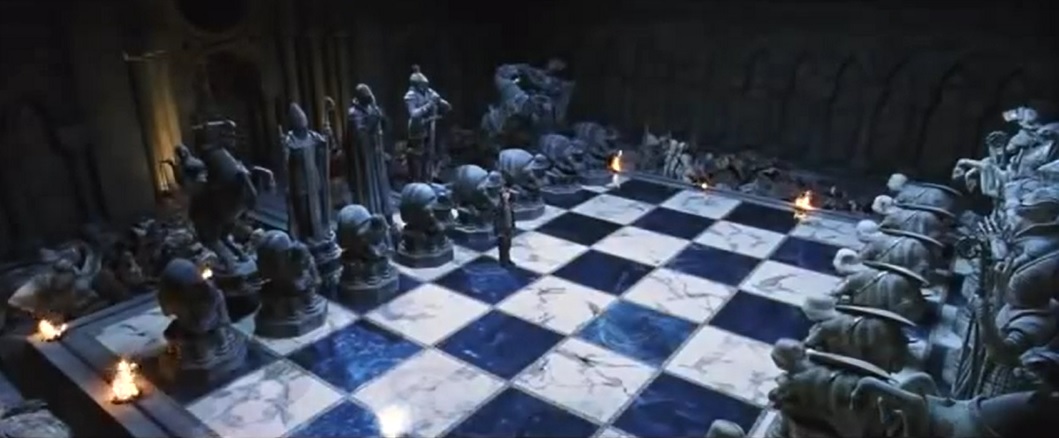 |
| The film's conclusion has a satisfying end to the mystery but action scenes a little flat |
 |
| Snape. Snape. Severus Snape. Has anybody else ever noticed how Snape practically sings when he enters the class? "There'll be no foolish wand waving or silly incantations in my class" |
Despite my gripes with the filmmaking I can't help but like Philosopher's Stone. It's a bit wooden sure, but it's charming and cute. The filmmaking style is underdeveloped, ok, but the warm nostalgic glow just hits the right note. The scene that sums the film up nicely for me is where Harry learns he has Christmas presents for the first time. Radcliffe's face is just filled with delight, as the music swells, yet there's this bittersweet undercurrent to the scene that I wish could have been explored more. But it was made to appeal to as many people as possible, so sticking to the book was the mantra. Overall it sets things up and does an ok job. It's a mess but it's my mess.
OK one scene that has bothered me for years. How dramatic it is when Ron 'sacrifices' himself when playing the giant wizard's chess at the end. I get that in the book Ron has to take the place of the missing knight so he literally takes a hit from the queen for Harry to win the game. But in the film, I guess they thought it would be too violent, so Ron is riding on top of the horse in the film and I guess the impact of the Queen smashing the horse ... hurts him ... because he blood-curdingly screams...and urm...what?
Harry Potter & The Chamber of Secrets (
8/10) is a marked improvement over the first film. While the direction highlights some of the similarities on a purely narrative level to the original,
Chamber of Secrets balances great world-building, improved acting from the leads and a more complex mystery to solve. While I don't think think 'darker' necessarily equates to 'higher quality' (DC Film execs - are you listening??),
Chamber definitely benefits from a shift in tone. I actually think it might be the strongest mystery in the whole series. During a particularly terrible summer, Harry is accosted by a house elf called Dobby, who warns him of great danger if he returns to Hogwarts. And the house elf's warning comes true. Harry returns to Hogwarts to find that students (and cats) are being petrified by a mysterious being. The only clue is a sentence written on the walls, scrolled in blood, announcing the return of the Heir of Slytherin and that the Chamber of Secrets has been opened. Worse still, Harry is under suspicion when it is revealed he can talk to snakes, an ability shared by a certain dark lord and a mysterious blank diary which may hold the answers to a traumatic past...
 |
| Chamber of Secrets benefits greatly from a darker tone |
 |
| A dark mystery is a foot in Hogwarts in Year Two ... plus the annoyance that is Colin Creevey |
My major gripe with
Chamber of Secrets is losing Hermione for a chunk of the story. It's a trio - they all complement each other. I think Rowling wanted it to be Harry that solved the mystery, as part of his character development, but Hermione's absence is felt. That and the film highlights some odd similarities between this one and
Philosopher's. Hermione repairs Harry's glasses. Harry believes something about the school that nobody else does. The gang take a venture in the forest and are rescued by a magical being of some kind. Dumbledore leaves the school at a critical hour. It feels more like a sequel at times than part of a wider series, if that makes sense. Now that said, when you get past the similarities of the narrative bones, the actual story of
Chamber is much richer than
Philosopher's. Harry's personal journey in this one is of identity. We know he is a hero and the legacy that follows him around like a lead balloon. As accusations of being the heir of Slytherin begin to mount against Harry, he starts to question whether he does belong in the right house and ultimately if the path he is on is the correct one. This questioning of black and white, good and evil is weaved throughout the film.
The world-building in this one is great. We learn about the founding of Hogwarts and how the founders were split apart by the ambitions of one Salazar Slytherin, who only wanted to recruit 'pureblood' children (pureblood meaning both magical parents). Here, the film introduces a racism angle. For witches and wizards who come from non-wizarding families are called 'mudbloods', a word one doesn't hear often in civilised conversation, whom Slytherin wanted expelling from Hogwarts. Suddenly, the magical world Harry finds himself inhabiting is not so sunny as he initially thought. This is actually quite a subtle set-up for the belief system of Lord Voldemort, whose manifesto was magical dominance. An accidental trip to Knockturn Alley, a dingy place not far from Diagon Alley, further exemplifies this. Rowling's liberal politics shine through with this angle to the universe and helps to bring an uncomfortable sense of reality. This is explored with the character of Dobby. He has never been my favourite element of the films, nevermind in the books, but Rowling does use him to highlight important issues of slavery and racism. A little act, a little change can go a long way to change someone's life. But ... Dobby is pretty irritating and his plan to stop Harry from returning to Hogwarts is sheer lunacy. The design of the character isn't particularly great either and the CGI has not aged as well as, say, Gollum. Great art design and acting can get you far - but Dobby doesn't quite hit the mark here. He has a couple of good moments, especially when he stops talking, but the character doesn't have the same emotional weight as the wretched creature from
Lord of the Rings and his absence from the later films is pretty telling (until they
need him again in
The Deathly Hallows). See in the books, he continually appears after
Chamber of Secrets and plays an important role in
The Deathly Hallows. It just comes across as random in that film when he pops up again but I'll discuss that more when I get there. Hindsight is a wonderful thing.
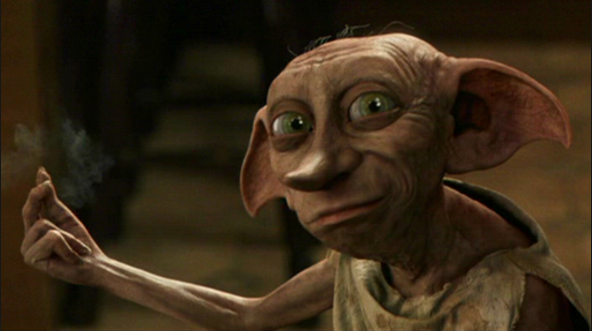 |
| Dobby. Never one of my favourite elements in the movies and the filmmakers didn't seem to care ... until he was needed in The Deathly Hallows |
 |
| The always magical Harris gives one of his final performances in Chamber |
Now, amongst the dark tone introduced into the world, there are plenty of moments of levity. Harry is rescued from his dreary summer with the Dursleys by Ron and his brothers in a flying car. Harry spends the rest of the summer staying at the Weasley abode. Here, we meet Ron's mother and father (Julie Walters briefly appeared in the original but she is given more time here). They are as bright, caring and inquisitive as you want them to be. I particularly love Ron's father questioning Harry on the minute details of the Muggle world. There's the exciting action sequences in which Harry and Ron must run away from hundreds of giant spiders in the Forbidden Forest. There's also great fun to be had with the trio brewing the Polyjuice Potion in the girl's bathroom, while being tormented by the hilarious Moaning Mrytle. Myrtle is a ghost stuck to this location and is obsessed with her own death - which is fairly important to the plot. See, the gang need to get into the Slytherin common room to talk to Draco Malfoy, whom they assume is the Heir of Slytherin or may at the least have an idea of what is going on. So they brew a potion to make themselves look like Malfoy's goons to trick Malfoy into giving up the information. The whole set up is great and the icing on the cake is an accident that occurs when Hermione brews one of her potions to look like a Slytherin girl ... and launched a thousand furry fan fictions in the process....Speaking of the little brat, Draco Malfoy's entrance in this one is great, as he literally waits on the balcony of a bookshop for Harry to walk by, so he can taunt him some more. But this film announces the entrance of another over the top performance - Malfoy...Sr.! Well Lucius Malfoy, as played by Jason Isaacs, is an absolute treat. Again, this is a scenery chewer. Every line he says is just filled with malleolus, which screams "I'm totally not a bad guy'! I particularly love his final line - "you'll meet the same, stickyy, end". I know this is meant to be menacing but it's more funny than anything. Issacs is clearly having a great time. Another new cast member is Kenneth Branagh as celebrity Gilderoy Lockhart, which begins a series tradition of having a new Defence Against The Dark Arts tutor each year. Branagh brings a smug, conceited, but kind of likeable, quality to Lockhart who is only just hiding the fact that he is a fraud. Again, this character weaves in Rowling's theme of blurring good and bad. Things are never quite what you expect them to be.
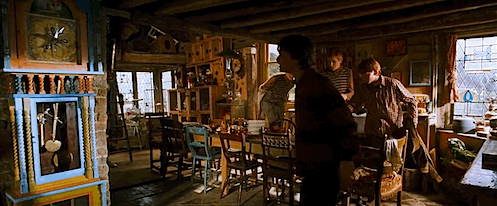 |
| The Burrow - one of the best sets in the whole franchise |
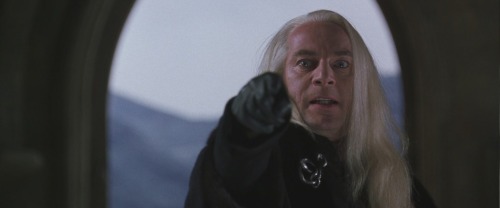 |
| Warning! A new scenery chewer approaches! |
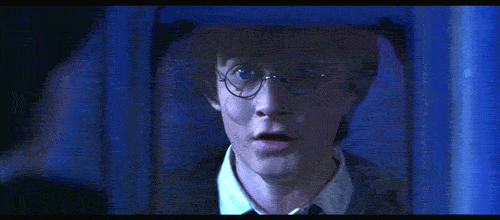 |
| GIFs have proven very useful in this article! |
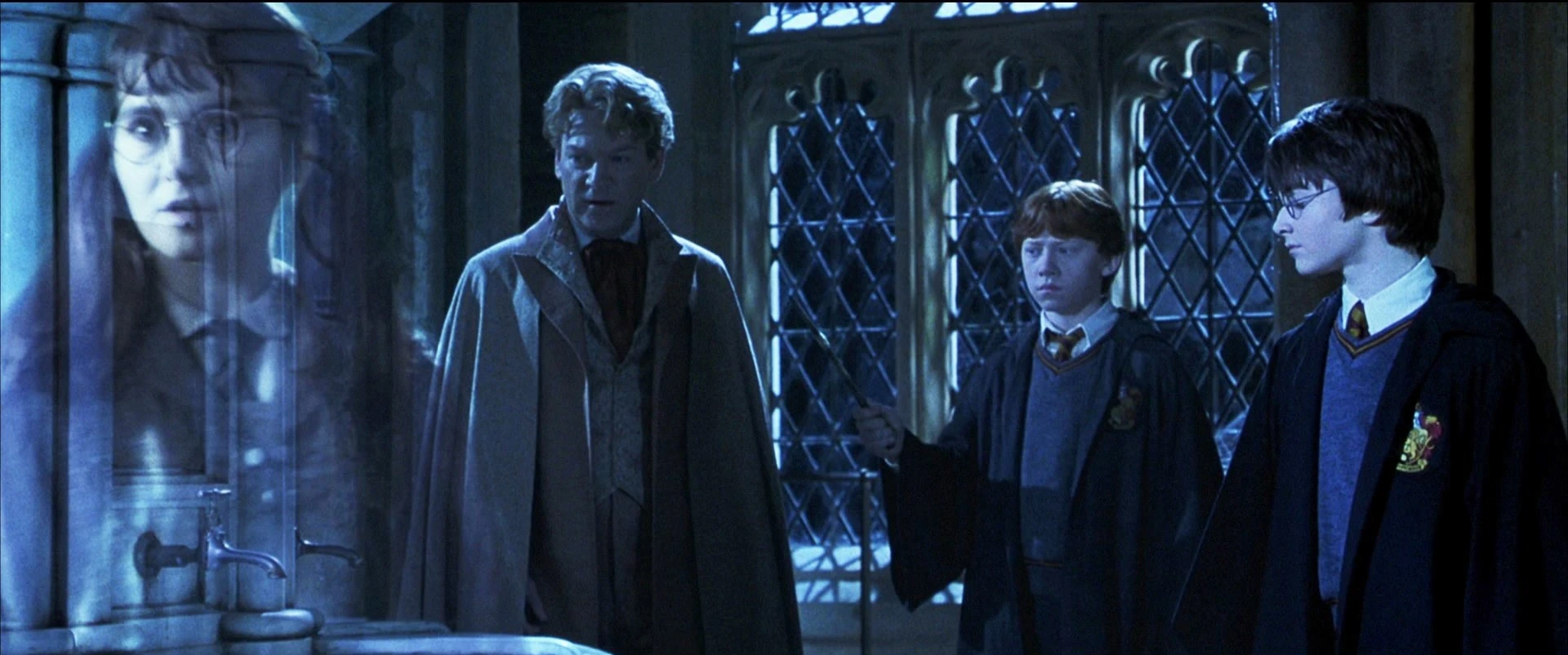 |
| Moaning Myrtle - she'll make you laugh, she'll make you cry and she may or may not be at the centre of the complex mystery of Chamber of Secrets |
The conclusion of the story is excellent. It turns out that the spirit of Voldemort, an echo from the past, has returned to the present through a mysterious diary that Harry finds and has been continuing Salazar Slytherin's 'noble' work - expelling 'mudbloods'. There's a very real threat that Hogwarts could close. Harry must try to defeat this shadow, revealed to be a younger Voldemort when he was known as Tom Riddle but must also combat with a 50 foot basilisk. Ok, I was going to save this for later but feels it's apt now. Why did Voldemort have to be a slithering, slimy, snake man? Honestly, I find the idea that Voldemort is an ordinary guy more...well scary. I find Christian Colson much more threatening than Ralph Fiennes ever was as we can see that Voldemort was human. I love Fiennes but his over-the-top performance is very silly and the design is pretty generic 'evil' monstrous villain. My argument is only strengthened by the scenes where Harry is teleported into the past through the journal and we see Tom Riddle interacting with young Dumbledore and Hagrid. This is just a reminder that evil is not quite a black and white as, say, the original film made it out to be and that Voldemort was indeed human, and, more importantly at one point, a boy. Then there's delight when realise that Tom Marvolo Riddle is fact an anagram for "I Am Lord Voldemort". For a kid, that was mind-blowing, especially as the fiery letters form the chilling sentence.
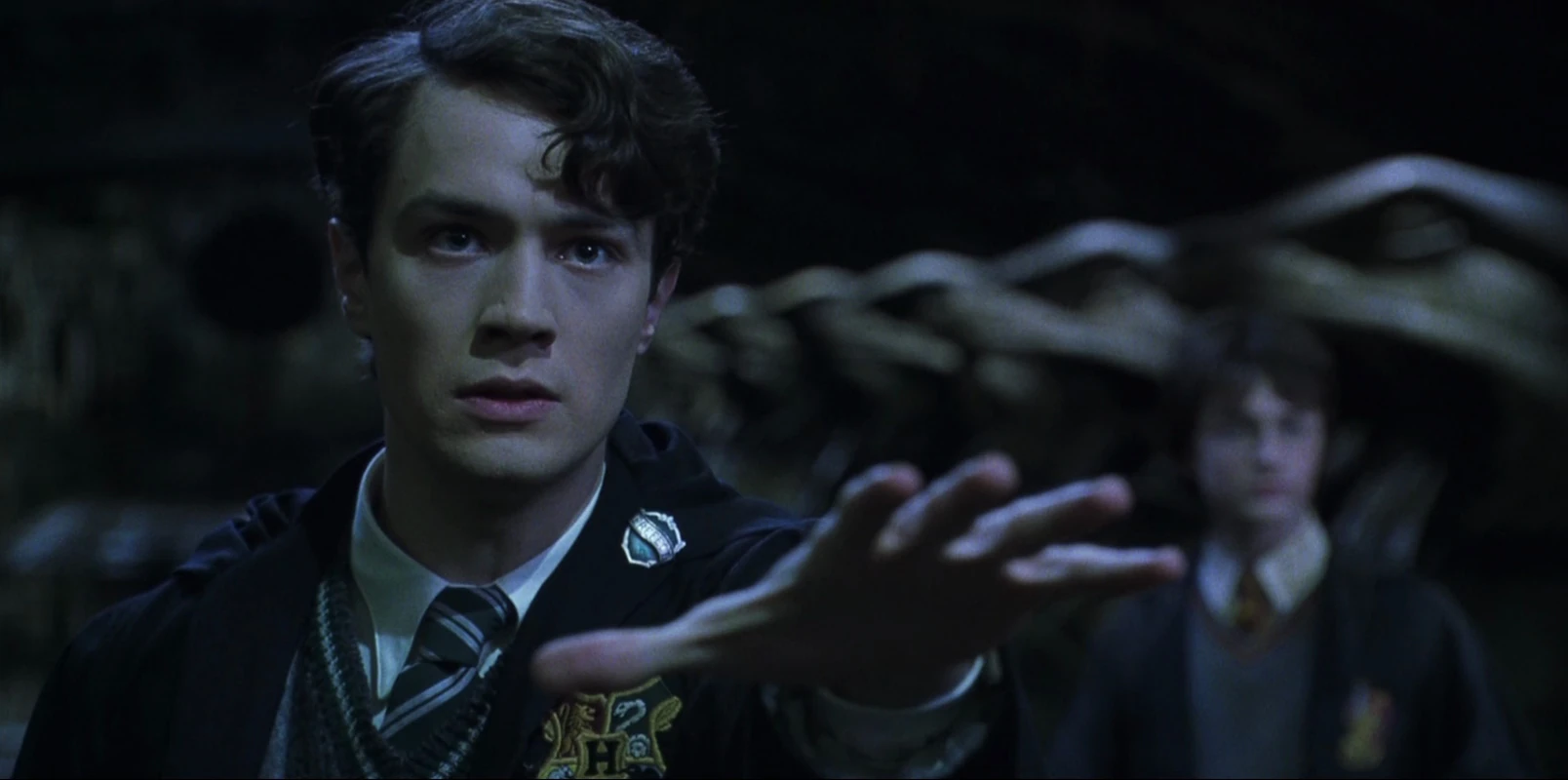 |
| Christian Colson is more chilling and threatening than Ralph Fiennes ever was as Voldemort |
|
|
|
_-_Basilisk_Slayer/revision/latest/scale-to-width-down/670?cb=20120402162822) |
| One of the best action scenes in the whole series sees Harry fight the terrifying basilisk, who has the nasty ability of petrifying those who stare directly at it |
 |
| Things are never what they appear to be ... especially when dealing with Gilderoy Lockhart |
As a part of the franchise, the literal adaptation highlights that this is one of Rowling's strongest books.
Chamber of Secrets does an excellent job of expanding the world (and how this affects the characters) and developing the characters. It is one of Rowling's best mysteries and one of the most concise stories. There's a great sense of menace round every corner and I love how the film beats Harry down. After accusation and accusation, he goes to see Dumbledore and is alarmed when his beautiful phoenix, Fawkes (seriously I love the music for Fawkes - like, I'm getting chills just thinking about it), bursts into flames. Dumbledore steps into the office and Harry instantly goes on the defence, assuming the head master will think it was his doing. But Dumbledore knows better as a baby phoenix rises from the ashes. It's a beautiful scene and one of my favourite in the whole franchise. And that sums up
Chamber for me. The character work is more complex, the world feels more full realised and, while the style is still workman-like, the films were clearly getting more mature. There would soon be a big shake up in the production of the films that would finally bring a unique voice to the
Harry Potter world.
OK so, another odd scene (fell like I'm going to do this for every film). It's Diagon Alley, Harry. Like, who pronounces it Diagonally? I get that he was nervous but...seriously?
Overall, the first two
Harry Potter films do a decent job of establishing the world and the characters. While the world never really comes to life in the original film,
Chamber of Secrets begins to expand on the lore, introducing new shades of light and dark. Chris Columbus' direction is very predictable but its sufficient enough. It would take a change in directors to truly bring the best out of the young cast. However, the films went down really well with audiences, who enjoyed the goofy and innocent tone. Looking back at them as part of a wider franchise, the more innocent Spielberg style matches the material of the earlier, simpler Potter novels.
Chamber of Secrets introduces a new vein of maturity as more morally ambiguous material are introduced to the world. The transition from
Philosopher's to
Chamber is actually pretty smooth but the same regimental style would soon to be shaken up by a director with a real vision for Rowling's Wizarding World...
 |
| The Spielberg Years come to an end with the excellent Chamber of Secrets |



















_-_Basilisk_Slayer/revision/latest/scale-to-width-down/670?cb=20120402162822)



No comments:
Post a Comment